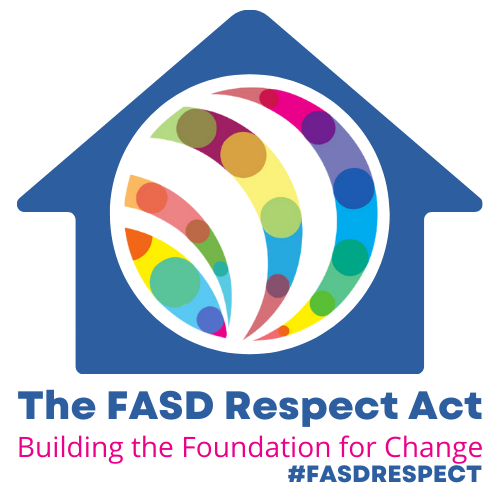What is the FASD Respect Act?

The FASD Respect Act (H.R. 3946/S.1800) is legislation addressing FASD on a federal (national) level, being re-introduced during the 2023-2024 118th Congressional Session. This bi-partisan legislation is co-sponsored in the Senate by Senator Lisa Murkowski (R-Alaska) and Senator Amy Klobuchar (D-Minnesota) and in the House of Representatives by Representative Betty McCollum (D-Minnesota, 4th District) and Representative Don Bacon (R-Nebraska, 2nd).
This bill will continue the work done in the 117th Congress by thousands of advocates and lawmakers to pass meaningful legislation that will positively impact the lives of people diagnosed with FASD or prenatal substance exposure.
What’s changed?
The FASD Respect Act 2.0 as we are calling it, is a shorter bill based on feedback and bi-partisan language agreed to in the Senate HELP Committee in late 2022. No less impactful, this bill if passed would allow HHS to provide:
- Promote and fund Education, Awareness and Services across community agencies and systems of care for infants to adults
- Provide funding to State and Tribal Systems for FASD Services throughout the lifespan
- Create Centers for Excellence to guide States and other systems of care in expanding diagnostic capacity, public awareness and outreach about FASD, and provide training and technical assistance on prevention, as well as supports and interventions for people diagnosed with FASD.
Get Involved
Want to get involved? Here’s how you can help!
Are you an Individual who supports the passage of The FASD Respect Act?
Are you an Organization that supports passage of The FASD Respect Act?
Are you a Legislative Staffer looking for more information on The FASD Respect Act?
Why do We Need the FASD Respect Act?
Harm to America’s children from prenatal alcohol exposure (PAE) is a significant public health problem and the most commonly known cause of developmental disabilities in the United States. Recent research shows an alarming prevalence of up to 1 in 20 first graders in the United States having the resulting disability of Fetal Alcohol Spectrum Disorders (FASD). PAE is especially harmful to the developing brain impacting all facets of a child’s life. Research also shows that alcohol causes far greater harm to the developing brain than any other drug combined, yet recognition of the disability — with appropriate supports and services — can prevent secondary disabilities (e.g., dropping out of school, getting into trouble with the law, alcohol and drug use, etc.).
Alarming gaps in FASD-related diagnostic and clinical resources are common throughout the United States. Among medical and behavioral health professionals, inconsistent use or limited knowledge of diagnostic criteria and clinical guidelines result in many (if not most) children and adults living with FASD going undiagnosed or misdiagnosed. Families in every state, and especially in the child welfare system, struggle with FASD, and they cannot find systems of care that are familiar with or are equipped to diagnose and address FASD-related disabilities.
Federal funding for FASD prevention and intervention has declined from $27 million as authorized in the Fetal Alcohol Syndrome Prevention Act of 1998 to just over $12 million in FY2021. Also, existing FASD efforts are hindered by fragmented federal, state and local policy approaches and a lack of resources specifically dedicated to FASD prevention and intervention. Although many states and local communities have programs and policies to help support FASD prevention, FASD-informed intervention practices and services are limited in most systems of care around the country, and the United States itself lacks a national agenda to unite government efforts towards a common goal.
